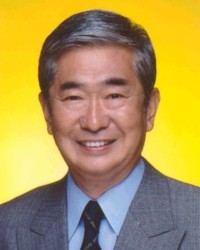Search Results - Shintaro Ishihara
Shintaro Ishihara
 was a Japanese politician and writer, who served as the Governor of Tokyo from 1999 to 2012. Being the former leader of the radical right Sunrise Party, later merged with Toru Hashimoto's Japan Restoration Party out of which he split his faction into the Party for Japanese Kokoro, he was one of the most prominent ultranationalists in modern Japanese politics. Ishihara was infamous for his misogynistic comments, his xenophobic views and his racist remarks against Chinese and Koreans in Japan, including his use of the antiquated pejorative term "sangokujin". He was also a denier of the Nanjing Massacre.
was a Japanese politician and writer, who served as the Governor of Tokyo from 1999 to 2012. Being the former leader of the radical right Sunrise Party, later merged with Toru Hashimoto's Japan Restoration Party out of which he split his faction into the Party for Japanese Kokoro, he was one of the most prominent ultranationalists in modern Japanese politics. Ishihara was infamous for his misogynistic comments, his xenophobic views and his racist remarks against Chinese and Koreans in Japan, including his use of the antiquated pejorative term "sangokujin". He was also a denier of the Nanjing Massacre.A critic of relations between Japan and the United States, his artistic accomplishments included his authorship of a prize-winning novel, his authorship of best-sellers, and his work in theater, film, and journalism. His 1989 book, ''The Japan That Can Say No'', co-authored with Sony chairman Akio Morita (published in English in 1991), called on the authors' countrymen to stand up to America.
After an early career as a writer and a film director, Ishihara served as in the House of Councillors from 1968 to 1972, then he served as in the House of Representatives from 1972 to 1995, just four years before he served as Governor of Tokyo from 1999 to 2012. He resigned from the governorship to briefly co-lead the Sunrise Party, before he joined the Japan Restoration Party upon his return to the House of Representatives in the 2012 general election. He unsuccessfully sought re-election in the general election of November 2014, and officially left politics the following month.
In October 2021, Ishihara was diagnosed with pancreatic cancer while his wife, Noriko had ruptured aortic aneurysm, and given only three months to live amid a routine physical exam. Ishihara died from its complications on 1 February 2022, at the age of 89. Provided by Wikipedia